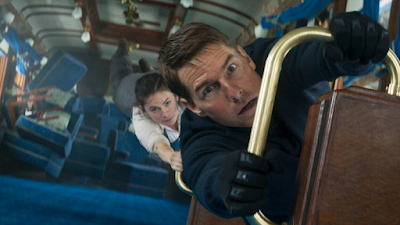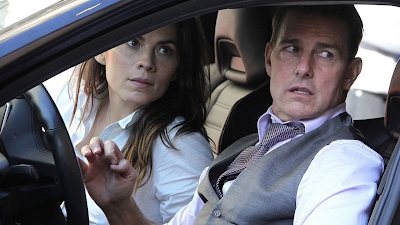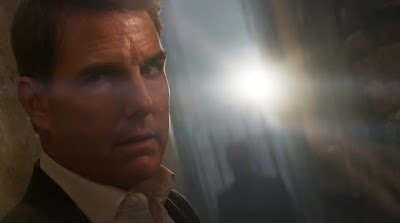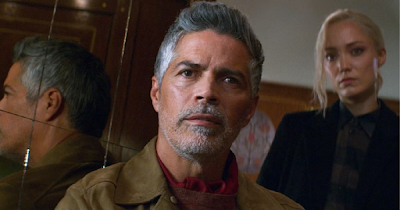“If there were a sympathy in choice,
War, death, or sickness, did lay siege to it,
Making it momentary as a sound,
Swift as a shadow, short as any dream,
Brief as the lightning in the collied night
That, in a spleen, unfolds both heaven and earth,
And ere a man hath power to say 'Behold!'
The jaws of darkness do devour it up;
So quick bright things come to confusion.”
--William Shakespeare, A Midsummer Night's Dream, Act I, Scene I
The espionage thriller has been flirting with science fiction for decades now. The first James Bond film, Dr. No, set the precedent, and the Harry Palmer films, the Flint films, and the Jason Bourne films have all followed its lead. The Marvel films are built in equal measure on the espionage thriller and on science fiction, with their very own super spy organization as a through-line lacing the entire franchise together. Get Smart had a character who was an android. It's in the DNA of the form now in spite of the best efforts of John le Carré and Graham Greene to ground the genre in reality. The Mission: Impossible television series and films are science fiction-y most of the time, with their cyberpunk stylings, but this year's Mission: Impossible-Dead Reckoning Part 1 (2023, directed by Christopher McQuarrie) crosses the border into broad sci fi with nary a backward glance. Like a good science fiction story, it starts with a what if: "What if a self-aware artificial intelligence infiltrated every corner of the internet? What if truth and reality became suspect, at the whims of that intelligence? What if the world's powers raced to gain sole control of that intelligence, and by extension, the world? And what if that intelligence had plans of its own?" Given the socio-political moment into which the film was released, an aware viewer can be excused for wondering if this question is even science fictional. She should ask, rather, are we living in a science fiction reality? (Note: we absolutely are). This is another film about The Singularity, a subject matter that is moving more and more out of science fiction and into the broader discourse about, well, everything. At this writing, the artists who create movies are on strike specifically to thwart the movie industry from replacing them with machines. There's a meme on social media noting that a future in which AIs compose poetry and art while human beings perform subsistence menial labor is NOT the future anyone imagined. More ominously, there is debate in technology schools like Cal Tech and MIT about the ethics of developing autonomous AI for use in drone weapons for the military. Every job in the world that doesn't require a pair of hands is under threat right now. If this sounds like a scenario that leads to Skynet, don't think the makers of Mission: Impossible haven't noticed this too. Dead Reckoning is absolutely descended from Colossus: The Forbin Project and The Terminator.
The plot begins on a Russian submarine equipped with a new computer brain and software that enables it to move through the ocean invisible to other powers. When it plays tag with an enemy submarine under the polar ice cap, they discover that they CAN be seen, and that their enemy is the phantom. Their new computer brain is compromised and they are sunk by their own torpedo. The two halves of the key to their computer float to the surface with the drowned crew, awaiting the thaw. Some time later, IMF agent Ethan Hunt is delivered a mission to retrieve one of the keys from a rogue agent. The agent is Ilsa Faust, Hunt's friend and longtime collaborator. He tracks her to the desert just as enemies are descending upon her. After a fierce firefight, Ilsa goes down just before Ethan can reach her. In Washington, a gathering of allied intelligence agencies are holding a summit. The CIA is in the process of transcribing all of their digital records to hard files because there is a ghost in their machine. There is a ghost in EVERYONE'S machine. To date, that ghost seems to be a prankster, causing no real harm, but the threat is there. The liaison to the IMF, Kitteridge, explains the apocalyptic implications of what he calls "The Entity" and notes that there are two halves of a key to unlock...something. One of Kitteridge's men delivers Kitteridge a gas mask before gassing the entire room. It's Hunt in disguise. He tells Kitteridge that he intends to destroy The Entity before it can fall into the wrong hands. The wrong hands, he assesses, are anyone's hands. Kitteridge demures. His orders are to acquire The Entity for the United States. Hunt and his team will be rogue agents if they pursue Hunt's agenda. Hunt proceeds anyway. The first step is to gain the second half of the key. There are other interested parties. At a meet with buyers for the key, it is lifted from Hunt by a pickpocket, a woman named Grace. Her motives and employer are ambiguous. Is her presence an accident? Also present are the agents working for Kitteridge and CIA director Denlinger, who have orders to put a stake through Ethan's heart if necessary. And there's a third presence, Gideon, a man who can wipe his digital footprint from surveillance in real time. He's a figure from Hunt's past who sends a chill down his spine. The race for the key takes all parties to Rome and then Venice, where a buyer has been arranged by Hunt's old frenemy, The White Widow. Gabriel and his assassins are on the hunt there, too, and Gabriel confronts Ethan directly with a murderous choice. Gabriel is working on behalf of The Entity, as its human disciple and avatar. Meanwhile, the systems Ethan and his team rely on begin to go haywire. The Entity has infiltrated them. When the White Widow and Gabriel move to the Orient Express the next day, Ethan and his team must chase them using old school low tech methods. They recruit a reluctant Grace for the mission, and tell her that she may be offered a choice, should she choose to accept it...
This edition of Mission: Impossible casts a wide net for influences. The opening of the film reminds me of The Hunt for Red October while I stopped counting the gags inspired by Harold Lloyd and Buster Keaton about halfway through the movie. A friend of mine said of this film's signature stunt--the one in all the trailers--that she'd already seen The Spy Who Loved Me. The end of the film is an escalation of the best part of Jurassic Park 2. The party in Venice seems like a refugee from John Wick 2 where the criminal underworld debauch themselves in the splendor of a vanishing or vanished world. (Actually, a lot of the film seems inspired by the John Wick movies now that I think about it). As a story, this is an overlay of The Terminator onto the espionage thriller. The various roles from The Terminator can be mapped onto specific characters: Gabriel is The Terminator, Hunt is either John Connor or Kyle Reese or maybe both at once. Grace is Sarah Connor. I mean, this is a genre film and genre films are all thieving magpies, so none of this bothers me in the least, particularly because Cruise and director Christopher McQuarrie are very, very good at taking their inspirations and speculating, "Yes, and...," to expand them in meaningful and often spectacular ways. This was a characteristic of their previous two Mission: Impossible movies, and they've honed that to a fine art in this third film.
For example: The extended climax of this film includes a fight sequence on the roof of a train. There have been a lot of these in the history of cinema. This sequence specifically lifts a gag from Harold Lloyd's short film, "Now or Never." In that film, Lloyd winds up running along the length of a train just ahead of a tunnel--a stunt Lloyd performed for real (his famous climb up a clock tower in Safety Last was aided by camera trickery; that stunt forms the inspiration for Tom Cruise's ascent up the Burj Khalifa Tower in the fourth M:I film). The Lloyd stunt is a hundred years old and has seen many variations over the years. This film's embellishment is novel: both Cruise and Esai Morales as Gideon end up sliding from side to side once the train enters the tunnel to avoid the emergency lights on the roof. For what it's worth, I don't know how much of this was real and how much of it was CGI, but knowing Cruise, I think the answer is probably "more than you might think." The film's signature stunt, in which Cruise jumps a motorcycle off a mountain and parachutes to the train was famously done for real by Cruise himself and contrary to my friend who compared it to The Spy Who Loved Me, included a number of wrinkles that distinguish it, including a fair number of close-up shots taken by drones that followed Cruise off the mountain. This is spectacular. Also spectacular is the ever escalating obstacles inside the train once the movie goes literally off the rails. This is a combination of the plate-glass scene in The Lost World with a dash of Laurel and Hardy and a piano going up some stairs. It's an instance of one damned thing after another on steroids. It's an incredible sequence, one that ratchet's up the tension in a way a film full of digital stunts would fail at. Ditto the chase through Rome in a tiny Fiat that culminates in a nod to The Italian Job. More than once, I stopped to ask myself how in the world they got that footage, including a shot from inside the car where a barrel roll causes Cruise and Atwell to change seats. I just threw up my hands at that one. Purely as a movie experience, Dead Reckoning 1 is state of the art action filmmaking and it can stand with its predecessors in the pantheon, in whose mighty company it shall now feel unashamed. That the film is more than an action film is an unlooked-for blessing.
The first two Terminator movies are a touchstone for this film's epistemology, too. Sure, this is a thrill ride, but it's a thrill ride where part of the thrill is in the ideas underneath the story. This is a film, like The Terminator, where the ascendancy of artificial intelligence promises a deterministic future, where every choice is forestalled by an algorithm. If you've been on social media a while, you can already see this happening if you've ever tried to get Facebook or Twitter to show you the content YOU want rather than what those services want you to see. The counterbalance to this deterministic future is the underlying ethos of the Impossible Missions Force, in which there is an emphasis on choice ("your mission, should you choose to accept it..."), which is normally just a quirk of the franchise but which seeps into the plot of this film and into its overarching themes. In order to preserve their choice, the members of Ethan's team have to abandon algorithms and surveillance for the efforts of their own eyes and their own wills. This is a startling development for a franchise that has always been on the cutting edge of technological trickery. It is significant that Grace's profession as a pickpocket and thief generally relies not on technological trickery or what have you, but on pure legerdemain. That set of skills becomes increasingly important to the plot of the film as it goes on. This is a fundamentally melancholy film, perhaps reflecting the times into which it has been released. The previous several Mission: Impossible films have had an apocalyptic bent, but they've been apocalypses of a James Bondian sort. The apocalypse posited by this film seems like a funhouse mirror of the apocalypse ongoing in our own world outside the film frame. The questions this film is asking about free will, about the role of artificial intelligence as either a servant or a master of humanity, are questions that are very much au currant. We are heading into this film's future like a speeding out of control train. That image, so central to this brand of thrill ride, can't be an accident.
This feels like a franchise winding down, too. Cruise was 61 years old the day this film debuted at theaters, after it was delayed by the Covid pandemic. Surely he can't keep doing these films. His co-stars are aging, too, particularly Ving Rhames, who is the only actor to also appear in every film of the series. The idea of replacing Cruise with, say, Jeremy Renner seems to have fallen by the wayside and whenever a series splits a film in two, like this one has, it's generally a sign that we're at the end. This film has not exhausted the series potential, though. The variety of new and returning characters is impressive. Kitteridge hasn't been seen since the first film and he hasn't missed a beat. Henry is just as shady and reptilian here as he was in the first film. Paris, Gabriel's chief assassin played by Pom Klementieff, is a striking film presence in spite of her limited screen time and almost complete lack of dialogue. Gabriel himself seems like Morales is channeling Deathstroke from the Teen Titans (who he played for the second season of HBO's Titans series). This makes his character another coded reference to The Terminator given that in the comics, Deathstroke is also named "The Terminator". On the other side of the fence, Haley Atwell's Grace is delightfully ambiguous throughout, and represents the chaos individual choices introduce to a deterministic system. She's this film's Golden Apple of Discord, she's the Mule conquering the Foundation by flouting psychohistory, she's John McLaine at the party by mistake. Harnessing or reacting to that chaos forms a large part of the film's plot. An old military dictum states that no battle plan ever survives contact with the enemy and it seems like it is Grace's role to teach that to both Ethan Hunt AND The Entity. If the film has a sour note, it's the role given to Ilsa Faust in the film's plot. Rebecca Ferguson is such a charismatic actor in the role that it seems almost criminal for the film to consign her to the sidelines and then to oblivion, though I wonder if her fate in this film is foreshadowed by the opening movement as an elaborate feint. I hope so. If not, it's a sorry use of a fabulous character.
In most respects, this film lives up to the standards of the best films of the franchise, but somehow, I like it a tad less than I like either Rogue Nation or Fallout. Those films form a dyad within the series, much like this film will form with its sequel. Those films feel self-contained. You don't need to see either one to enjoy the other. This film, by contrast, feels like half a movie. True, the filmmakers tell you this up front with the title of the film, but it lacks something at the end; a catharsis or a sense of closure perhaps. I suspect that after the last ten years of tentpole franchises, I'm tired of franchise building. Dead Reckoning Part 1 is good enough to get me in the theater for Part 2, but it could have done that without its open ending and lack of resolution. I almost feel sorry for the filmmakers for setting themselves up to fail. This film is so charged with rocket fuel that if the follow-up fizzles even a little, it will seem a disappointment. But who knows? The future, as Kyle Reese once told Sarah Connor, is not fixed. There is no fate but what we make. Here's hoping that's true.

This blog is supported on Patreon by wonderful subscribers. If you like what I do, please consider pledging your own support. It means the world to me.






















No comments:
Post a Comment